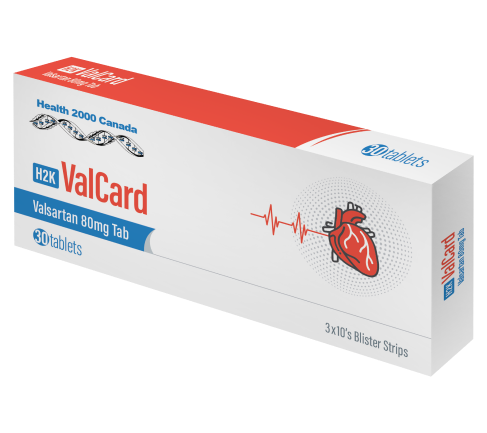Valcard Tablets
Valsartan / Hydrochlorothiazide / Amlodipine

Valsartan / Hydrochlorothiazide / Amlodipine

Valsartan is indicated for the treatment of hypertension, lower blood pressure. It the risk of fatal and nonfatal cardiovascular events, primarily strokes and myocardial infarctions.
Lower high Blood Pressure
Treat Heart Failure
Improve survival after a Heart Attack
Valsartan belongs to a class of drugs called angiotensin II receptor blockers (ARBs). These drugs are often used to treat similar conditions.
Valsartan works by blocking the effect of angiotensin. This makes the blood vessels to relax more. It also allows the kidney to get rid of extra water and salt. This helps in lowering the blood pressure.
80 mg
160mg
320mg
This drug is used to treat high blood pressure. Lowering high blood pressure helps prevent strokes, heart attacks, and kidney problems. Valsartan is an angiotensin receptor blocker (ARB) and works by relaxing blood vessels so that blood can flow more easily. Hydrochlorothiazide is a "water pill" (diuretic) that causes you to make more urine, which helps your body get rid of extra salt and water.
Blocks binding of angiotensin II to type 1 angiotensin II receptors; blocks vasoconstrictor and aldosterone-secreting effects of angiotensin II.
Thiazide diuretic that inhibits sodium reabsorption in distal renal tubules; results in increased excretion of sodium ions and water, as well as potassium and hydrogen ions.
80mg / 12.5mg
80mg / 25mg
160mg / 12.5mg
160mg / 25mg
320mg / 12.5mg
320mg / 25mg
Amlodipine, valsartan and hydrochlorothiazide tablets are indicated for the treatment of hypertension, to lower blood pressure. These benefits have been seen in controlled trials of antihypertensive drugs from a wide variety of pharmacologic classes, including amlodipine, hydrochlorothiazide, and the ARB class to which valsartan principally belongs. There are no controlled trials demonstrating risk reduction with amlodipine, valsartan and hydrochlorothiazide tablets.
Amlodipine is a dihydropyridine calcium channel blocker that inhibits the transmembrane influx of calcium ions into vascular smooth muscle and cardiac muscle. Experimental data suggest that amlodipine binds to both dihydropyridine and nondihydropyridine binding sites.
Angiotensin II is formed from angiotensin I in a reaction catalyzed by angiotensin-converting enzyme (ACE, kininase II). Angiotensin II is the principal pressor agent of the reninangiotensin system, with effects that include vasoconstriction, stimulation of synthesis and release of aldosterone, cardiac stimulation, and renal reabsorption of sodium.
160mg / 5mg / 12.5mg
160mg / 5mg / 25mg
160mg / 10mg / 12.5mg
160mg / 10mg / 25mg
320mg / 10mg / 25mg